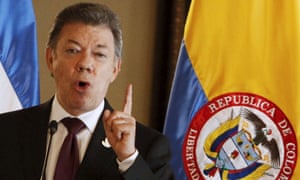
The president of Colombia will present a plan for the complete and radical overhaul of global policy towards drug trafficking and organised crime at a special session of the United Nations general assembly.
Unveiling his proposals in the Observer, Juan Manuel Santos said urgent measures were needed to bring about “a more effective, lasting and human solution” to the misery and crisis of narco-traffic.
The most sensational element in Santos’s presentation is the announcement that his government will – as a result of a four-year peace process soon to bear fruit as a peace treaty – be implementing its own domestic struggle against narco-traffic alongside its bitter enemies, the Marxist guerillas of Farc. The group admits to having funded its war by what it calls “taxation” of narco-profits.
Santos says: “Colombia is close to reaching an agreement to end the 60-year armed conflict with the Fuerzas Armadas Revolucionarias de Colombia [Farc, the world’s longest-running guerilla insurgency] an agreement which is of special relevance to this discourse on the ‘war on drugs’.
“In post-conflict Colombia, Farc will change from being an obstacle for effective action against drugs to a key ally of the government in contributing to illicit crops substitution, provision of information on routes and production facilities and de-mining efforts to facilitate eradication of coca production. That in itself is a game changer.”
The president’s wider appeal to the UN demands a fundamental rewriting of global policy on drugs, drug-dealing and the laundering of drugs money. “We have done much,” he says, “but this cannot be an effort by one country alone. Vested with the moral authority of leading the nation that has carried the heaviest burden in the global war on drugs, I say I can tell you without hesitation, that the time has come for the world to transit into a different approach in its drug policy.”
His first point turns current thinking entirely on its head: he calls for leaders “to frame policy on drugs with a context of human rights, which stops victimising the victims of drug abuse”.
“Under this principle,” he says, “we expect to progress in preventing stigmatisation against drug users, abolishing death penalty for drug related offences and obligatory treatments for drug abusers, among other measures.”
A second proposal aims to make it easier for nations to reform their drug laws in accordance to specific needs and threats to populations, rather than being straitjacketed by international conventions. Though such reforms may “occur outside the international conventions, controlled experiments in regulating the drug markets should continue to develop, and be monitored by UN agencies” . This opens the way to legalisation or relaxation of laws on punishment and possession.
The third element to the proposals challenges the global community to adopt “a more comprehensive approach” to the drugs crisis. “We need a transition from a purely repressive response to introduce a public health framework to the treatment of drug consumption focusing on prevention, attention, rehabilitation and resocialisation of drug abusers,” says Santos.
He calls for “alternative measures other than prison” and “prioritising an effective rehabilitation and resocialisation of offenders”. In countries such as Colombia, where many livelihoods depend on drug production, Santos urges “social and economic alternatives” that will “create the necessary conditions to bring them back to legality”.
A fourth point insists that member states “persist in combating transnational organised crime”. Colombia, Santos says, “will continue to offer its expertise and capabilities in combating these criminal enterprises to any country in the world that can benefit from our hard-earned experience”.
The Colombian ambassador to the UK, Néstor Osorio Londoño, said: “The world can no longer afford to continue tackling this issue exclusively with a repressive response. There is an urgent need to come around with a more comprehensive approach that incorporates socioeconomic and public health considerations along with reinforced international cooperation against organised crime. The pressing realities that five decades of war on drugs have left behind are the most powerful evidence that change is needed.”
[Source:- Gurdian]

